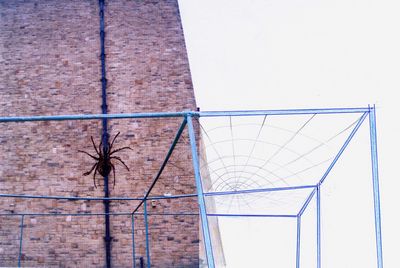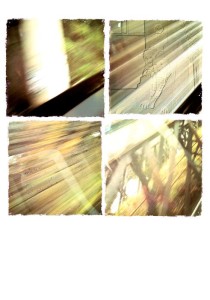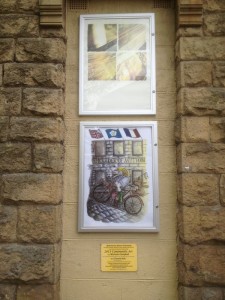I was delighted to be asked to contribute a piece of artwork for Mytholmroyd Station Partnership. (Click on the images to enlarge)
Category Archives: Site specific
Annelies Strba at the Bronte Parsonage Museum
Yesterday morning, a friend took me up to the Bronte Parsonage Museum to see an exhibition by Annelies Strba. Strba had produced a series of haunting images in response to the Brontes and their home. The images are digitally manipulated photographs of her daughters and granddaughters (I believe), and they have a fairy tale quality to them. They are displayed on small canvases, carefully placed throughout the rooms of the museum, as if they were objects that could have been owned by the Brontes. I found that these small, luminous images added a feminine spirit to the rooms, as if they were the spirits of the Bronte girls themselves. In fact, I think they represent dreams – actually, Strba’s dreams but they could be the dreams of poor Emily Bronte who died on the sofa in the house. The story of the Brontes is actually quite sad – the last remaining daughter, Charlotte, was only 38 when she died in childbirth – a death tragically prophesied by her Father who didn’t want her to marry her curate husband as he was afraid he would kill her. Some of Strba’s pictures are quite dark, possibly in response. Others explore feminine experience in quite an imaginative way, particularly one positioned over one of Branwell’s paintings of Madonna and Child, which I think explores what Mary’s actual experience might have been.
Overall, an extremely rewarding exhibition, and I would definitely recommend a visit. It’s on until 31 October this year.
Spider and Web in Situ
Today, I installed my spider and web at the nature trail at Ferney Lee school (with the help of the caretaker and a mobile scaffolding unit). Here they are in situ.
Making a Spider – step by step
Step one: I made the two body sections using two thicknesses of garden wire. The thicker wire forms the main structure of an oval-shape. The thinner wire weaves around this to strengthen the structure.
Step two: I made the legs out of double-thickness strong garden wire, and attached them to a wire running down the centre of the top body section (‘prosoma’). They flopped about a bit, so I tied them down with lots of the thinner wire, and reinforced them in places with lengths of old garden cane. I started to cover the back section with hessian, but it looked like a body in a sack, so I decided to use cut strips of hessian instead.
Step 3: I covered the spider with strips of cut hessian (rough sacking material), binding and stitching it with rough garden twine.
Detail of wrapped leg.
Step 4: I lightly painted it with matt black outdoor paint, leaving some of the hessian colour showing through. This gives it a rather scarily realistic colour and markings.
If I did it again, I’d do it differently. Attaching the legs is most problematic – I think they should have been attached to a stick-structure in the centre. Also, the body might be stronger if it was made from chicken wire, but it would be harder to get the right shape.
Spider
Well, here she is! The completed spider for my nature trail site specific sculpture project, to go with her web. The real fun starts when I try to install them both next week.
She’s made from garden wire, sticks, hessian, garden twine and black matt outdoor paint. If anyone is interested in how she was constructed, leave a comment below and I’ll post photos of the different stages.
Spiders Web progress
It actually stopped raining today, so I grabbed the chance to finish spinning my Spider’s Web for my nature trail project. I’m glad to get back inside again; my fingers are frozen!
Spiders web in progress
I have purchased string, and spent an afternoon in the sunshine building a spider’s web in the garden. Those spiders are clever creatures you know. You don’t catch them tying knots and wrestling with a needle and thread.
Site specific project
I’m currently working on a proposal for a site specific artwork to be sited within a school nature trail. The nature trail came from a patch of school land that had been ignored for a number of years. The current school caretaker took a look around it, and realised that over those years a number of wild species had taken up residence. He proposed that the land could be turned into a community and education resource by turning it into a nature trail. The project also includes raised beds and composting areas where the children and community can learn about growing food.
My proposal is to build a huge spider’s web (complete with spider) to help visitors see the site from a bug’s perspective. The site is used for bug studies (amongst other things) and hopefully the piece may highlight the importance of these smaller creatures to the health of the soil. Here’s how it might look.


